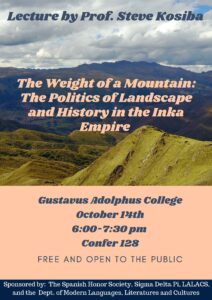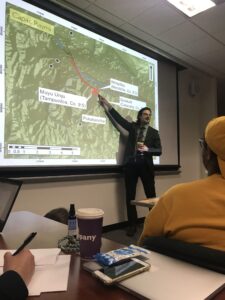
Professor Steve Kosiba’s presentation on the Incan empire was incredibly detailed and timely, as it was on Indigenous People’s Day. It was a great opportunity to learn more about an ancient civilization and spark thoughts about the context in which it relates to how society perceives globalization and the cultural conflicts that exist today.
The idea that the perception of time is different within Incan culture was something particularly interesting. Rather than perceiving time and events in a linear fashion, the Incas note where something happened and believe that the event is then embedded in the place, creating a circular perception of past, present, and future. These places, wak’as, are places of great significance even today, having both mythical and ritual significance in the lives of the Incas. The very origin of their civilization derives from the concept that a deity exists within natural formations, and that those places are sacred and are not limited by a linear ideology of time. The idea of mythology being tied to a whole different perception of the world is a wide and profound thought to puzzle with, something to still be considered even after the presentation.

It is notable that there was a presentation on Indigenous People’s Day to educate about a specific culture, since that is so often lacking in primary education. However, it is important that indigenous people are not acknowledged for a single day and then ignored. Their cultures and livelihood are not a box to check off every year and their values and leadership are important to recognize today, as they are often at the front of environmental activism. Though learning their history is important, there are many real issues that are not being addressed by world authorities. Most indigenous people in the Americas have had their land taken from them, land that has cultural, religious, and historical importance, like the wak’as. Losing such a sacred place leads to a loss of identity, which is often disregarded in present day discussion as land ownership is often only perceived through the means of possession. More than becoming educated on other cultures, as a society it is important that we use these educational opportunities to become engaged with the voices of indigenous people so that these cultures are valued as much as Western ideology. More than any of the specific details discussed during Professor Kosiba’s presentation, the most important thought to take away from it was “There are many different ways to view the world, and it is limiting and ignorant to believe that there is only one, disregarding the people and civilizations whose lives are built on those histories and values.”
Written by Michaela Woodward, ‘23
Leave a Reply
You must be logged in to post a comment.